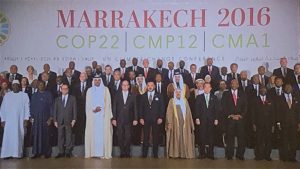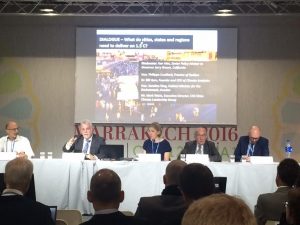Day 8 Update
The high level segment began today, with 80 Ministers from different countries, along with Ban Ki Moon and others presenting speeches that highlighted the continued ambition to tackle climate change. Since the negotiations this year are important yet more about process than substance, our students spent much of their time in the other sides to COP – the side events, networking, information sharing and momentum building, as well as absorbing meetings with a high-level diplomat and a top economist in the climate change world. Read below:
Bella
Today we are here in Marrakech to see the historic moment. 110 Parties (by 16th Nov) have joined Paris Agreement, which totally account for more than 75% of carbon emission across the world. I am so happy to see the world’s determination to tackle climate change challenges despite the disappointing news after US election. Secretary General Ban Ki-Moon commented that the choice we are making today cannot endanger our future generation. We must reduce subsidies to fossil fuels and promote the transition to renewable energy.
I also talked to Scott Vaughan, the President and CEO of International Institute for Sustainable Development (IISD), about the attitude of international organizations towards the future of climate change action. He said that although the election was a huge shock to most of us, many people who is concerned in climate change issues, including IISD, have started to seeking pathways to tackle this problem without engaging Washington. State governments will follow the trend, so do other local leaders. Quebec and Ontario will not stop cooperating with California. Investments will follow the trend, so do civil society and business world.
Let’s be positive. This is the COP of action!

Adam
Last week, I wrote how I hoped COP22 would provide some much-needed optimism following the U.S. presidential election. And I must say, just two days into the second week, optimism abounds here in Marrakech. I worried that last week’s news would suck the air and energy out of the COP — but if anything, it seems to have had the opposite effect. I get the sense that domestic uncertainty has sparked an uptick, at least for the moment, in motivation among other countries and nongovernmental/subnational actors. It remains to be seen, of course, whether this motivation sustains itself and turns into action. But from this morning’s launch of the NDC Partnership to an afternoon panel focused on action at the city, state, and regional levels, there was no shortage of glimmers of hope.
Ryan
After the whirlwind day yesterday, moving between events without any clear plan, i was able to focus today on presentations and meetings that were of high interest to me. While going around the COP several themes stood out to me that seem to be prevalent across all different groups here. The first is the optimism and drive that all parties are showing to meet our climate goals despite the results of the US election. We heard the French Ambassador for Climate Change, Laurence Tubiana, give an impassioned speech saying that climate change cannot wait on political uncertainty and stressing the need for action at the subnational level.
The second recurring theme that i noticed is the need to mobilize private finance to combat climate change. To do this there needs to be clear policy signals that show private investors that investing in clean energy projects is not only beneficial for our climate, but will provide return on investment. Massive amounts of financial resources will be needed to keep warming levels below 2 degrees and private companies will be pivotal in achieving the financial goals need to reach our emission goals.
Diana Tarrazo
Today our group got the opportunity to speak with both Jennifer Haverkamp, the US Department of State’s Special Representative for Environment and Water Resources, as well as Harvard’s Joseph Aldy. They both gave us wonderful insight into the negotiations, and we’re very fortunate to have met with them. Outside of speaking with Haverkamp and Aldy, I attended several side events covering a broad range of topics from climate finance to climate change and marine protected areas.

Perhaps the most interesting presentation I attended, and one that was in line with my focus topic of subnational actors, was a presentation titled, “Under 2MU: 2050 Strategies Toward 1.5 Degrees with States, Regions, and Cities.” The presentation featured speakers including Phillppe Couillard, the Premier of Quebec. I am incredibly encouraged by the work Quebec is doing with respect to climate change mitigation–it sources 99 percent of its energy from renewables, has a carbon market that was linked with California in 2014, and instituted a carbon levy in the 1990s. All of these subnational policies and actions were a response to an indifferent central government. Examples from Quebec give me optimism for subnational actor engagement in the United States in the coming years under the new Administration.
Jeremy
Starting off the day could not have been more exciting. I attended the NDC Partnership event with over 20 Foreign and Environmental Ministers from developed, developing and middle income countries. These Ministers spoke about their commitment to working with each other and ensuring all parties met the NDC goals. Many developing countries recognized that even though they had the political and economic will to implement major reforms, they lacked the funding or expertise. This is the role that the developed countries and financial institutions would fill. Organized by Morocco and Germany, it seems like an amazing partnership. Even with the Presidential Election there is aura of momentum throughout the conference, something that this event highlighted.
There is much left to do but it seems there is still hope to finish up what started in Paris.